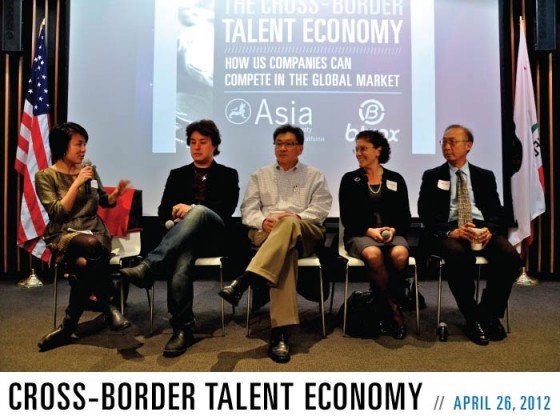
Btrax Design Company > Freshtrax > How U.S. Compan...
How U.S. Companies Can Compete in a Global Market
“Cross-Border Talent Economy” is co-hosted by btrax and Asia Society, sponsored by ChinaSF and Bay Area Council. It featured 5 professionals who are heavily involved with employment and immigration issues. The panel discussion took place in the heart of San Francisco financial district, with a special blend of various industrial backgrounds including venture capital, business, academic, legal and HR.
How international talent differ from those from the United States?
We all know that the world market nowadays is borderless. Technology significantly shortened physical distances between business people around the globe. However, problems still stand: how do you work with a person if you cannot see them on a regular, face-to-face basis?
Hiring talent from overseas render companies a different perspective, diversities collide and generate innovative ideas. Vice versa, these international professionals usually bring fresh point of views to their original country, thus make the world market even closer and more productive.
Challenges of hiring & keeping overseas talent
As for some companies, they choose to hire talent directly from their home countries. For instance, btrax usually conduct initial interviews through Skype, time differences thus has to been put in consideration. When a person is considered for the position, the company has to work with lawyers to figure out what type of visa/how to apply for a work visa for this person. Sometimes, companies find it is impossible to bring a person in simply because of visa problems.
On the other hand, even if the person obtained a work visa, that does not necessarily mean he/she is guaranteed to be able to work here 3 years from now, due to the visa expiration issues. In this sense, neither the employer nor employee feels stable, and usually cause many problems in terms of work assignment.
As for large corporates and C-level talent, what are the challenges?
In most cases, larger international corporates will have a better infrastructure to seek and hire senior level overseas professionals.
However, another trend being emerged is that the United States is exporting as many talent as it is importing – we find lots of higher level American professional leave their country to explore more opportunities.
Countries from Asia, for example, is one of the fastest growing regions of the world; in this sense, going back to home countries and build up your resume there might be a great option, and gives you a larger chance to be spotted by corporations in the United States.
On a larger scale (policy & system), what problems are there?
On a structural level, the US immigration system is still limited to a few labor categories, which does not fit the modern society and employment status quo. The last major change in terms of labor categories happened back in the 1980s, the immigration framework is set in a time that we are no longer living in.
Take Silicon Valley for example, a majority of companies here desperately need software engineers and designers, yet the policy is still leaning towards mechanic engineering and many traditional sciences. Practically speaking, lawyers find cultural prejudice still hinders global talent from obtaining a work visa.
If there is one thing you want to change about immigration policy,
what it will be, and why?
- Flexible Visa: the world market is so small, talent mobilization is so frequent that a type of visa which let international talent travel between countries without time limitation is strongly desired;
- Creativity: before early 2000s, immigration policy is less restricted, so lawyers can use their creativities to apply for visas for their clients (Lisa used to turn a cheese chef into a food scientist, which later became a famous case study material for practical immigration laws).
- Academic background requirement: as for H1B visa, a BA/BS degree is required in order to apply for a work visa. However, we find many talent without a bachelor’s degree are as good as those who have. Paperwork and documents is almost the only source for immigration office to decide whether or not to issue a visa, which is partial per se.
Check Out Our FREE E-Books!
Discover our FREE e-books packed with valuable research and firsthand insights from industry experts!
Dive into our collection below, and stay tuned – we’re constantly adding new titles to keep you ahead of the curve.
- Big in Japan: Global Brands Thriving in the Japanese Market, Vol. 1
- A Guide to the Promotional Seasons in Japan
- What I Wish I Knew Before Entering the Japanese Market
- 100+ Facts to Understand the Motivations Behind Japanese Behaviors
- Insights on Japan’s Changing Workstyle
- Insights into Japan’s E-Commerce and Direct to Consumer (D2C) Market








